Do You Really Need a Receptionist in Your Office?

People might smile and say a cordial hello in the morning, but most employees usually don’t pay enough attention to the receptionist. This is unfortunate, however, since the receptionist plays one of the most significant roles in the entire organization.
The Role of the Receptionist
Does your company have a receptionist in your building? While you might only come to the receptionist when you need help with a particular task, your receptionist is there all day, serving the needs of your company in a very visible and highly-engaged manner.
The role of the receptionist is manifold. For starters, they handle a myriad of administrative and office-related tasks, such as:
- Data entry. Do you have forms, files, applications, and other paperwork that need to be digitized and entered into different software programs? In many cases, these tasks land on the desk of the receptionist.
- Phone answering. One of the major duties of a receptionist is to pick up the phone and direct calls to the appropriate parties. In a large company, the phone can ring off the hook for hours on end.
- Packages and deliveries. When the Postal Service, UPS, or FedEx drops by with a package or delivery, it’s the receptionist who greets them. It’s up to the receptionist to either accept the deliveries or route the individual to the appropriate person/department.
- Whether it’s a random person, an employee looking for guidance on who to see about a specific matter, or a salesperson requesting a meeting with someone in the organization, random questions and requests often make their way to the receptionist.
Don’t let the menial nature of these tasks lead you to wrongly assume the receptionist is nothing more than a glorified pencil pusher. In addition to performing these duties, a receptionist also serves as the face of the company – or at least the face of your office.
Some of the other responsibilities include:
- Greeting people. When someone walks into your office, the receptionist is quite literally the person who “receives” or greets them. In fact, this is arguably the most important duty of a receptionist. A good first impression goes a long way towards establishing a positive relationship and the receptionist has significant influence over this exchange.
- Providing concierge services. In addition to greeting people, the receptionist is generally tasked with providing concierge services. From connecting guests with the right individual within the company to getting water and snacks for people while they wait, there’s always something to be done.
- Acting as a host. At the end of the day, the receptionist acts as a host to people while they wait for someone within the company to arrive. As such, receptionists are required to have people skills and must be able to make “small talk.”
“What all of these point to is that receptionists shape the first impressions people have of your company. They are your most important brand ambassadors,” says Andy Alsop, President, and CEO of The Receptionist, an automated visitor management system for modern offices. “That’s why many organizations are moving away from the title ‘Receptionist’ and toward something more descriptive, like ‘Director of First Impressions’ or ‘First Impressions Officer.’”
Technology Promotes Positive Change
When you study the different tasks, duties, and responsibilities the modern receptionist has, it’s clear that they’re spread thin. There’s always something important to be done, yet the administrative tasks tend to keep receptionists tethered to their desks more than they should be. Thankfully, new technology is promoting positive change in this area.
Clearly, the most important receptionist duties are those in the second category – i.e. the ones that involve soft skills and interpersonal connections. The challenge is that tasks like data entry, accepting deliveries, and handling repetitive requests consume a lot of time and often prevent receptionists from being good brand ambassadors for the company.
The good news is that technology is promoting positive change in this area. While automation is needed in almost every area of business, it’s arguably most valuable in outward-facing situations where it allows an employee to streamline the mundane and increase engagement in high-touch situations. Some examples of innovative technology in this area include:
- Automated visitor management systems
- Automated phone answering and voicemail systems
- Online appointment scheduling software
While some people in business would argue that technology is making the role of receptionist obsolete, this simply isn’t true. Technology is allowing the modern receptionist to spend less time on administrative tasks and more energy on creating positive first impressions and strong connections with those outside the company.
As your business looks for a way to maximize resources, make sure your receptionist is provided the appropriate technologies and solutions. Because, at the end of the day, your receptionist’s most important duty is to enhance the company’s brand image.
Bring the best of the CEOWORLD magazine's global journalism to audiences in the United States and around the world. - Add CEOWORLD magazine to your Google News feed.
Follow CEOWORLD magazine headlines on: Google News, LinkedIn, Twitter, and Facebook.
Copyright 2025 The CEOWORLD magazine. All rights reserved. This material (and any extract from it) must not be copied, redistributed or placed on any website, without CEOWORLD magazine' prior written consent. For media queries, please contact: info@ceoworld.biz








